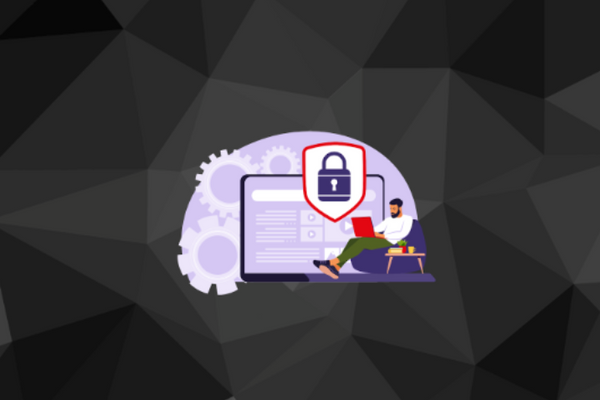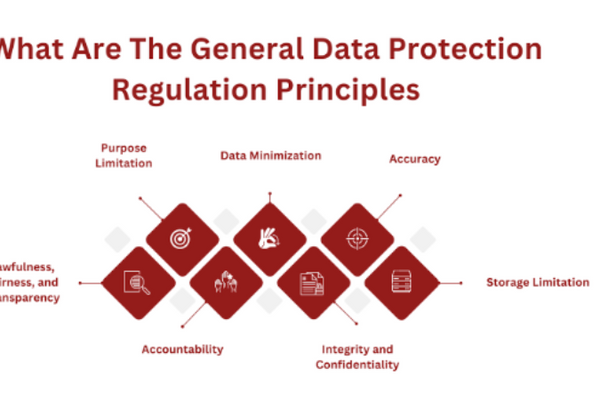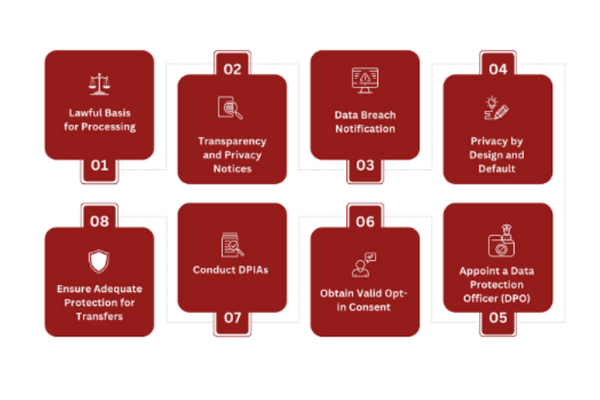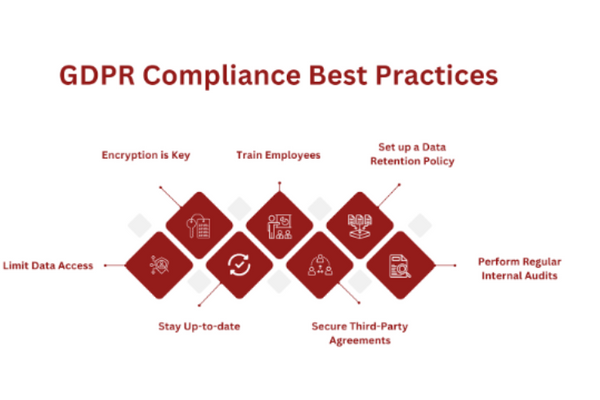
If your business is subject to the General Data Protection Regulation (GDPR), abiding by the GDPR compliance requirements is critical to avoid financial penalties and reputational damage.
Since its introduction, the GDPR has been known as the gold standard for data protection, ushering in the world’s toughest legal data privacy framework yet.
This article will explore GDPR’s compliance requirements, privacy principles, and practical steps your business can take to stay on the right side of the law.
Let’s dive right in.
Key Takeaways
The GDPR is a privacy law that gives EU residents significant control over their personal data. It applies to businesses that collect or process EU personal data, regardless of location.
Among other obligations, the GDPR requires businesses to maintain strict consent standards, observe several consumer rights, implement adequate data security measures, and report data breaches to relevant authorities.
Failing to comply with the GDPR can lead to severe consequences, including fines of up to €20 million or 4% of a business’s global annual turnover.
What is the GDPR and Why Does it Matter?
What is the GDPR.png

The GDPR is a comprehensive law established to protect the privacy rights of individuals within the European Union (EU) and the European Economic Area (EEA). It was approved by the European Parliament on April 14, 2016, and enacted on May 25, 2018.
The GDPR is currently considered the world’s most robust and strictest privacy law. It imposes specific requirements on businesses (even beyond the EU) that collect the personal data of EU residents or monitor their behavior.
With fines for violations amounting to tens of millions of dollars, GDPR compliance shouldn’t be taken lightly. That being said, compliance isn’t just about avoiding penalties; it’s also about conducting business operations ethically and respecting people’s privacy.
When businesses handle personal data responsibly, they fulfill their corporate compliance responsibilities and contribute to developing a more privacy-conscious society.
8 Consumer Rights Under the GDPR
The GDPR grants EU residents eight rights over their personal data. As an applicable business, you must observe these rights and help consumers exercise them promptly upon request.
Here are the eight consumer rights under the GDPR:
Right to Access: Your consumers have the right to know what personal data you collect and process about them, why you do it, and for how long. You must provide this information free of charge upon their request. This is commonly known as a Data Subject Access Request (DSAR).
Right to Rectification: If the data you hold about consumers is inaccurate or incomplete, they can request that you correct or update it. Ensure you act promptly and notify consumers once you’ve made the changes.
Right to Erasure (Right to be Forgotten): Consumers have the right to request the deletion of their data if it’s no longer needed or they withdraw consent. Note that you don’t have to honor this right in certain instances. For instance, when you need the data to fulfill a legal obligation.
Right to Restriction of Processing: If your consumers dispute the accuracy of their data or object to its processing, they can ask you to restrict its use while resolving the issue.
Right to Data Portability: Consumers can request a copy of their data in a structured, commonly used, and machine-readable format and transfer it to another service provider if they wish.
Right to Object: Consumers can object to the processing of their personal data for direct marketing or legitimate interests. Unless you have a legally justifiable reason, you must immediately stop processing consumers’ data once they object.
Rights Related to Automated Decision-Making and Profiling: Consumers have the right not to be subject to decisions based solely on automated processing, including profiling, if it significantly affects them.
Right to Withdraw Consent: If you rely on consent to process your consumers’ data, they can withdraw it anytime. You must be clear about how consumers can do this and ensure the withdrawal process is straightforward.
Data Processing Principles of the GDPR
Data Processing Principles of the GDPR.png

Compliance isn’t just about ticking boxes; it’s about respecting the privacy and trust of the consumers whose data you handle. For this reason, the GDPR sets out the seven principles businesses must observe when handling personal data.
Here are the GDPR’s principles:
Lawfulness, Fairness, and Transparency
‘Lawfulness’ in this context means identifying at least one of the GDPR’s six lawful bases for data processing. In addition, you must handle consumers’ data responsibly and be transparent about why and how you use their data in your privacy policy.
Purpose Limitation
This principle stipulates that you only collect and use personal data for specific and legitimate purposes. In other words, don’t use data for anything unrelated to what you told consumers when you obtained the data.
Data Minimization
The GDPR requires you to collect and use only the data you truly need to fulfill your stated objectives. By avoiding excessive data gathering, you reduce the risk of data breaches or misuse. Remember, you’re responsible for protecting every piece of data you collect.
Accuracy
Under the GDPR, personal data must be kept accurate and up to date. So, you’ll need to promptly rectify or delete inaccurate data once identified.
Storage Limitation
Building on the data minimization principle, the GDPR requires that businesses only keep personal data for as long as it’s necessary for pre-established purposes. To do this, you’ll need to update your data retention policies and delete any data you no longer need.
Integrity and Confidentiality
Maintaining the integrity and confidentiality of personal data is paramount to GDPR compliance. In practice, this means implementing measures to prevent unauthorized access, loss, or damage to the data you process.
Accountability
As an applicable business, you’re responsible for demonstrating GDPR compliance. As such, you must maintain comprehensive records of your data processing activities and keep your policies up-to-date.
GDPR Compliance Requirements
GDPR Compliance Requirements.png

Observing the GDPR compliance requirements not only keeps you on the right side of the law but establishes a solid foundation for your business’s growth and success.
Below are the most significant requirements under the GDPR:
Lawful Basis for Processing
As mentioned, the GDPR requires businesses to identify at least one lawful basis before conducting data processing activities. In other words, you must have a valid reason to justify collecting or using consumers’ personal data.
The six lawful bases set out under the GDPR are:
Consent
Contract
Legal Obligation
Vital Interests
Public Task
Legitimate Interests
For instance, if you run an online store, you’ll need customers’ information (e.g., names, email addresses, etc.) to process their orders. This falls under the lawful basis of fulfilling a contract.
After identifying your lawful basis, ensure you document it for transparency.
Transparency and Privacy Notices
Transparency is key under the GDPR. Accordingly, you must provide consumers with a clear and straightforward privacy policy, informing them about your data processing practices.
Your privacy policy must include details about your purposes for processing, data retention periods, and consumer rights. It must also be easily accessible on your business website and written in plain language.
For example, when someone signs up for your newsletter, explain in your privacy policy how you’ll use their email address and how they can unsubscribe at any time.
Data Breach Notification
In the event of a data breach that poses a risk to consumers’ rights and freedoms, you must notify the appropriate supervisory authority within 72 hours of becoming aware of it.
Additionally, if the breach is likely to result in high risks to consumers, you must inform the affected consumers without undue delay. This means you’ll need a well-defined crisis management plan to mitigate damages swiftly and effectively.
Privacy by Design and Default
The concept of ‘privacy by design and default’ means considering data protection at the beginning of any processing activity.
In practice, you’ll need to incorporate data protection, privacy, and security into the fundamental design of your business’s products and services.
Appoint a Data Protection Officer (DPO)
A DPO is an independent privacy consultant who oversees GDPR compliance, provides useful advice, and acts as an organization’s primary point of contact for data protection authorities.
Under the GDPR, you’re required to appoint a DPO if any of the following applies:
You’re a public authority (excluding courts)
You engage in large-scale systematic monitoring of EU residents
You handle significant amounts of sensitive data
Even if you don’t fall under this category, designating a DPO remains a best practice to ensure top-notch data protection standards. Moreover, outsourcing DPO work is a simple and efficient way to fulfill this responsibility.
Obtain Valid Opt-in Consent
If your business relies on the lawful basis of consent, you must adhere to the GDPR’s standards.
Under the law, consent must be freely given, specific, informed, and unambiguous. In other words, consent must be characterized by explicit affirmative actions, such as ticking an empty checkbox, clicking a prominent “I Agree” button, or providing a written statement.
Importantly, consumers must also be able to withdraw their consent at any time, and you must make it easy for them to do so.
For instance, if you use cookies for tracking, you need to ask for explicit cookie consent and provide a simple way for users to change their preferences.
Conduct Data Protection Impact Assessments (DPIAs)
A DPIA helps identify and minimize data protection risks. As such, the GDPR requires businesses to conduct DPIAs for data processing activities that might result in a high risk to consumers’ rights and freedoms.
For instance, before implementing a new customer profiling system, you should perform a DPIA to assess and mitigate potential threats.
Ensure Adequate Protection During Cross-Border Data Transfers
When transferring the personal data of EU residents outside the EU/EEA, you must ensure “adequate” protection for such data outside the GDPR’s jurisdiction.
If the destination country doesn’t have an EU adequacy decision status, you’ll need to rely on alternative transfer mechanisms, such as Standard Contractual Clauses, Binding Corporate Rules, or other approved safeguards.
GDPR Compliance Best Practices
GDPR Compliance Best Practices.png

In addition to the GDPR compliance requirements, businesses must observe several best practices to uphold high data protection standards. Here is a list of the GDPR compliance best practices:
Limit Data Access
Restrict access to personal data to only those employees who genuinely need it for their job roles. This reduces the risk of unauthorized access and accidental breaches.
Encryption is Key
Encrypt your stored and transmitted personal data. Encryption adds an extra layer of protection, ensuring that even if data falls into the wrong hands, it remains unreadable.
Train Employees
Conduct regular employee training sessions to raise awareness about best practices for data protection. After all, educated and vigilant staff are your first line of defense against data breaches.
Set up a Data Retention Policy
Establish a transparent data retention policy that outlines how long you will keep personal data and when you’ll securely dispose of it.
Stay Up-to-date
Keep regular tabs on changes in data privacy regulations and guidelines (including the GDPR). Compliance requirements may evolve, so staying informed is vital.
Secure Third-Party Agreements
Before sharing personal data with third-party processors and external partners, ensure they comply with GDPR and sign robust Data Processing Agreements (DPAs).
These agreements outline the data protection obligations of the processor and ensure that your data is handled responsibly.
Perform Regular Internal Audits
Regularly audit your data processing activities to identify compliance gaps and take corrective actions promptly.
Next Steps
When it comes to GDPR compliance, Captain Compliance is ready to lead your business to success. Entrust your data protection journey to our seasoned professionals, well-versed in the complexities of the GDPR’s strict standards.
To support your compliance initiatives, we offer comprehensive risk assessments, personalized compliance strategies, and robust implementation plans. With us by your side, your business will seamlessly navigate GDPR compliance requirements and you will have peace of mind.
Say goodbye to compliance worries and hello to data privacy success.Get in touch today!
FAQs
What is the GDPR, and does it apply to my business?
The GDPR is a comprehensive privacy regulation designed to strengthen the privacy rights of individuals in the European Union (EU). If your business collects or processes the personal data of EU residents, the GDPR applies irrespective of your location.
Read more about our GDPR Compliance Solutions
Can I ignore the GDPR if I’m already following local privacy laws?
There’s no shortcut to compliance. While the requirements of some privacy laws may overlap, the GDPR sets unique and specific standards businesses must meet independently.
Check out our CPRA Compliance Checklist
Can I still use customer data after GDPR compliance?
Absolutely! The GDPR doesn’t ban data usage; it ensures responsible handling. As long as you respect consumers’ rights and follow the rules, you can continue using personal data for your business needs.
Understand what a Data Inventory is here
What qualifies as “personal data” under the GDPR?
Personal data includes any information that can identify an individual, like names, addresses, email addresses, phone numbers, or even IP addresses.
It also includes sensitive data like health records, racial or ethnic information, philosophical opinions, religious beliefs, etc.